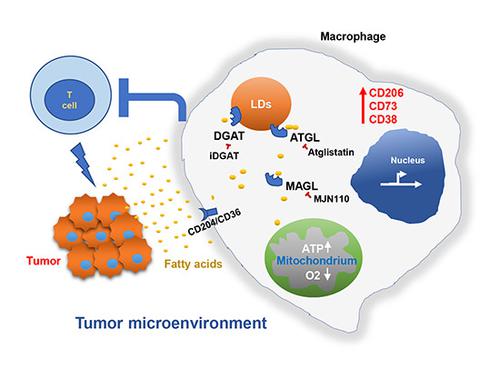当前位置:
X-MOL 学术
›
EMBO Mol. Med.
›
论文详情
Our official English website, www.x-mol.net, welcomes your feedback! (Note: you will need to create a separate account there.)
Lipid droplet-dependent fatty acid metabolism controls the immune suppressive phenotype of tumor-associated macrophages.
EMBO Molecular Medicine ( IF 11.1 ) Pub Date : 2019-10-10 , DOI: 10.15252/emmm.201910698 Hao Wu 1, 2, 3, 4 , Yijie Han 5 , Yasmina Rodriguez Sillke 2, 3, 6 , Hongzhang Deng 7 , Sophiya Siddiqui 2, 3, 4 , Christoph Treese 2, 3, 8 , Franziska Schmidt 2, 3, 4 , Marie Friedrich 2, 3, 4 , Jacqueline Keye 2, 3, 4 , Jiajia Wan 1 , Yue Qin 9 , Anja A Kühl 2, 10 , Zhihai Qin 1 , Britta Siegmund 2, 3 , Rainer Glauben 2, 3
EMBO Molecular Medicine ( IF 11.1 ) Pub Date : 2019-10-10 , DOI: 10.15252/emmm.201910698 Hao Wu 1, 2, 3, 4 , Yijie Han 5 , Yasmina Rodriguez Sillke 2, 3, 6 , Hongzhang Deng 7 , Sophiya Siddiqui 2, 3, 4 , Christoph Treese 2, 3, 8 , Franziska Schmidt 2, 3, 4 , Marie Friedrich 2, 3, 4 , Jacqueline Keye 2, 3, 4 , Jiajia Wan 1 , Yue Qin 9 , Anja A Kühl 2, 10 , Zhihai Qin 1 , Britta Siegmund 2, 3 , Rainer Glauben 2, 3
Affiliation

|
Tumor-associated macrophages (TAMs) promote tumor growth and metastasis by suppressing tumor immune surveillance. Herein, we provide evidence that the immunosuppressive phenotype of TAMs is controlled by long-chain fatty acid metabolism, specifically unsaturated fatty acids, here exemplified by oleate. Consequently, en-route enriched lipid droplets were identified as essential organelles, which represent effective targets for chemical inhibitors to block in vitro polarization of TAMs and tumor growth in vivo. In line, analysis of human tumors revealed that myeloid cells infiltrating colon cancer but not gastric cancer tissue indeed accumulate lipid droplets. Mechanistically, our data indicate that oleate-induced polarization of myeloid cells depends on the mammalian target of the rapamycin pathway. Thus, our findings reveal an alternative therapeutic strategy by targeting the pro-tumoral myeloid cells on a metabolic level.
中文翻译:

脂质液滴依赖性脂肪酸代谢控制肿瘤相关巨噬细胞的免疫抑制表型。
肿瘤相关巨噬细胞(TAM)通过抑制肿瘤免疫监视来促进肿瘤生长和转移。在本文中,我们提供证据表明,TAMs的免疫抑制表型受长链脂肪酸代谢(特别是不饱和脂肪酸)控制,此处以油酸酯为例。因此,在途中富集的脂滴被鉴定为必需的细胞器,代表化学抑制剂有效阻断TAM的体外极化和体内肿瘤生长的有效靶标。一致地,对人类肿瘤的分析表明,浸润结肠癌但未浸润胃癌组织的髓样细胞确实积聚了脂质液滴。从机理上讲,我们的数据表明油酸盐诱导的髓样细胞极化取决于雷帕霉素途径的哺乳动物靶标。因此,
更新日期:2019-11-07
中文翻译:

脂质液滴依赖性脂肪酸代谢控制肿瘤相关巨噬细胞的免疫抑制表型。
肿瘤相关巨噬细胞(TAM)通过抑制肿瘤免疫监视来促进肿瘤生长和转移。在本文中,我们提供证据表明,TAMs的免疫抑制表型受长链脂肪酸代谢(特别是不饱和脂肪酸)控制,此处以油酸酯为例。因此,在途中富集的脂滴被鉴定为必需的细胞器,代表化学抑制剂有效阻断TAM的体外极化和体内肿瘤生长的有效靶标。一致地,对人类肿瘤的分析表明,浸润结肠癌但未浸润胃癌组织的髓样细胞确实积聚了脂质液滴。从机理上讲,我们的数据表明油酸盐诱导的髓样细胞极化取决于雷帕霉素途径的哺乳动物靶标。因此,



























 京公网安备 11010802027423号
京公网安备 11010802027423号